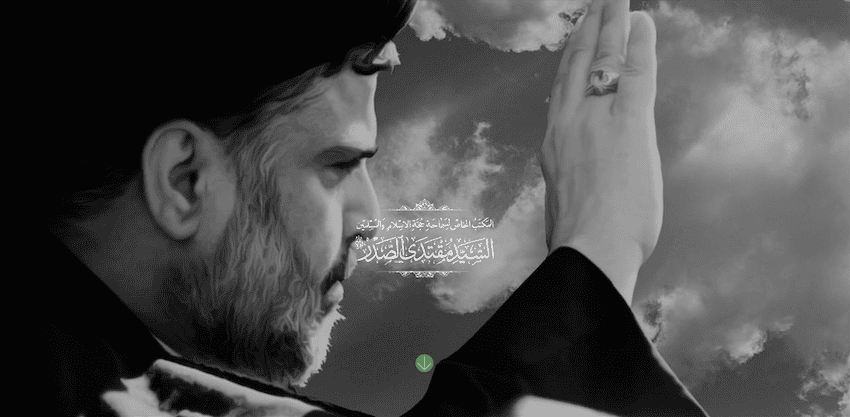Radical Shiite cleric Muqtada al Sadr threatened to attack US personnel inside Iraq and beyond if the US House of Representatives passed a bill that would have recognized Kurdistan and Sunnis in western Iraq as their own independent countries.
Sadr, whose Iranian-backed militia battled US and Coalition troops in Baghdad and central and southern Iraq during the occupation of Iraq, released a statement on his website on April 29 calling for attacks on US interests if Congress passed the National Defense Authorization Act for 2016. The statement was translated on the Facebook page Shiʿa Jihadica: Clericalism, Militias, and Messianism.
Sadr described the bill as “sectarian” and said its implementation would lead to “the beginning of the break up of Iraq.” He called on the Iraqi government and people to oppose the bill, which also calls for 25 percent of $715 million in funding to battle the Islamic State to go to Sunni tribes and the Kurdish government. He then leveled a direct threat to attack US interests inside and outside of Iraq.
“If the time comes and the proposed bill is passed, we will have no choice but to unfreeze the military wing that deals with the American entity so that it may start targeting American interests in Iraq and outside of Iraq when possible,” Sadr said.
“If America persists then it will cease to exist,” Sadr concluded.
The US House of Representatives ultimately removed the provision that called for the recognition of Kurdistan and Sunnis in western Iraq, but kept language that authorized direct funding of the two groups in the bill. Additionally, language that required the Iraqi government to end support for and cooperation with Shiite militias, many which are backed by Iran, was removed.
While Sadr’s threats may be considered idle to some, he has the capacity strike at US forces inside Iraq. And with Iran’s backing, he could target US interests in the region.
Sadr controls two militias inside Iraq: the Saraya al Salam, or Peace Companies (often called the Peace Brigades), and the Liwa al Yaom al Mawood, or Promised Day Brigade. Both groups are offshoots of the Mahdi Army, Sadr’s militia that fought US forces in pitched battles in Baghdad and central and southern Iraq between 2004 and 2008. Sadr purportedly disbanded the Mahdi Army in the spring of 2008 after US forces battled the group in Baghdad’s sprawling neighborhood of Sadr City, and created the Promised Day Brigade.
Sadr created the Peace Companies after the Islamic State overran most of northern and central Iraq beginning in June 2014. In February 2015, he purportedly suspended the activities of the two militias, however the groups have been spotted fighting in Iraq since then. Sadr also frequently claimed to have halted the activities of the Mahdi Army during the US occupation, but these ceasefires rarely held.
While Sadr has denied receiving Iranian support, the US military and government consistently stated that his forces have the backing of Qods Force, the special operations branch of Iran’s Islamic Revolutionary Guards Corp. US military officials called the Iranian-backed militias who battled American forces up until 2011, such as Hezbollah Brigades and Asaib al Haq (League of the Righteous), the Mahdi Army Special Groups. With the backing of Qods Force, Sadr’s militias maintain the ability to strike US interests in the Gulf region and the Levant.
Iran backs multiple Shiite militias that are fighting the Islamic State, all of which are hostile to the US. One of these groups, Hezbollah Brigades, is listed by the US as a Foreign Terror Organization, while senior leaders in others, such as Asaib al Haq, Kata’ib Imam Ali (Imam Ali Brigade), and Harakat Nujaba, are listed by the US as Specially Designated Global terrorists. Additionally, the Popular Mobilization Committee, the Iraqi-government sanctioned body that organizes the Shiite militias, is led by a Specially Designated Global Terrorist who the US described as “an advisor to Qassem Soleimani,” the commander of the Qods Force. [See LWJ report, US begins airstrikes against Islamic State in Tikrit, supports Shiite militias.]









5 Comments
deluded Sadr. go fight ISIS first. Without US your Iraq would have been Isis land already. Thank US you moron
I hate to agree with Atari Ali, but I never really did think much of the three state solution.
The bill will proceed Muqtada must know that, it could be a game changer.
US and Gulf destabilization policies are designed to weaken states deemed to be too independent for various self-interested groups throughout the region. Iran stepped into Iraq because the US couldn’t contain what it helped to unleash. At the same time, when US soldiers were being killed based on the intrigues of Saudi Arabia (Iraq) and Pakistan (Afghanistan) then Washington – just like the Saudi connection to September 11 – did zilch. Thankfully, the forces of Hezbollah in Syria and various Shia militias in Iraq are taking the fight to ISIS, al-Qaeda affiliates and other Sunni Takfiri groups. However, true to the policies of the US, then the armed forces of Syria and the Shia Houthis in Yemen are being threatened by the intrigues of Washington/Ankara/Doha/Riyadh and clearly this will benefit al-Qaeda affiliates and ISIS.
We all know that September 11, Madrid, Boko Haram, ISIS, AQAP, Taliban, al-Shabaab, Nusra, and so on, all belong to the Sunni Takfiri branch of terrorist organizations. In the meantime, Hezbollah in Lebanon continues to broaden its support of the main Christian party under Michel Aoun. Despite everything, The Long War Journal seeks to build up the Shia angle based on the deeds of who?
No doubt Sadr’s chips are on the board. Thank You for letting us know your forces are in play. Continuing to exist as an enemy of your own countrymen is a bad strategy. Shouldn’t you be focusing your efforts on defeating ISIS rather than watching congress? Priorities.